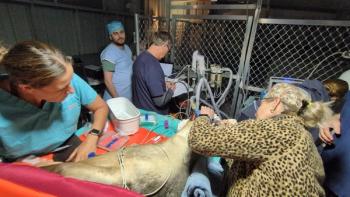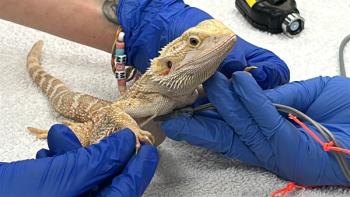
What does the (pet) fox say?
Your client just bought a pet fox (is that even legal?) and wants you to see it. Heres everything you need to know.
It's no secret: Fennec foxes are cute. They're also a LOT of responsibility.
Are pet foxes a thing? My daughter sure thinks so. (FYI, she's a passionate 15-year-old who hates taking “no” for an answer, so methinks if she wants a fox, she'll get one-someday.)
I've been seeing domestic fox videos pop up in my Facebook feed, and I know for a fact that
Question: So ... pet foxes, eh?
Dr. Chatfield: Domesticated foxes have been a thing for a while. They haven't reached fad status like hedgehogs yet, but they're lovely creatures and, with proper care and knowledge, can make good pets. There are different kinds of domesticated foxes that people can purchase for their own, and they're all a little bit different. Fennecs are super-cute and communicative; red foxes are more reserved. And if you purchase a Siberian fox, made famous by
Q: What do I do if somebody calls and wants me to see their pet fox?
Dr. Chatfield: Don't panic! You will be excited. Your staff will be excited. The clinic cat will be excited. Even though everybody will be excited, you'll need to be in control. Before the client even gets to the hospital, you need to:
Talk to your staff-this is not a dog or a cat; it's a fox. Be cautious and use standard precautions.1 Foxes are dang cute, and it's easy to forget that they have teeth and an opinion.
Phone a friend-talk with someone who has experience. If you don't have a friend to call, get on the internet. The Merck Veterinary Manual has some great information.
Q: What states are they legal in? Where do we go to find out about regulatory issues?
Dr. Chatfield: Foxes are typically governed under the wildlife regulatory body. It's legal to own foxes in many states, and a simple permit may be required. Other states have banned exotic pet ownership altogether, so select your state of residence wisely! However, banned or not, this doesn't make it illegal for you to treat the animal or advise the client. Veterinarians are not issued judicial robes upon graduation. Remember that your role is to keep people and their animals safe, not to function as the pet police. Encourage clients to obtain and hold the right permits for their exotic pets, but please do not withhold care from a sick animal simply because you disagree with the owner.
Dr. Petritz: This is complicated, and laws are constantly changing. According to
Q: How can a general practice veterinarian advise on nutrition and feeding?
Dr. Chatfield: Foxes are omnivorous, and you can feed them commercial dog food. Ask the client what the parents were being fed or what the breeder recommended to feed if you want to gather more information before making a recommendation.
Dr. Petritz: There are several websites that discuss fox ownership (in addition to Faithful Foxes' website, mentioned above, see
Q: What are your recommendations for wellness care?
Dr. Chatfield: Foxes should be vaccinated with the canine rabies vaccines, and kits should be 16 weeks old before they're vaccinated for rabies. I recommend keeping them on a one-year rabies vaccine schedule. If the fox bites someone, the public health department won't recognize the vaccine in most cases and the fox will be treated as unvaccinated, so advise your client accordingly. It doesn't mean the vaccine doesn't work in these species; it just hasn't been tested and shown to be effective.
Vaccinate against distemper and parvovirus on the same vaccine schedule as puppies and dogs (eight-, 12- and 16-week boosters; one-year boosters for adults), but don't use the modified live vaccine because it can potentiate disease. Use the killed distemper vaccine and stay on a one-year vaccination schedule. For intestinal deworming, use good ol' pyrantel pamoate-the dog dosage-two doses two weeks apart. Unless clinically indicated, I avoid fenbendazole as an empirical deworming choice as some exotic species have demonstrated significant sensitivity. Foxes can get heartworms and you can dispense heartworm prevention extralabel. Topical preparations of flea and tick medications also can be used off label.
Q: Any behavioral recommendations?
Dr. Chatfield: While they can be trained to be awake during the day, foxes are nocturnal animals. I recommend telling clients to crate-train their foxes and not let them roam free in the house at night, because while they're friendly, their behavior is still unpredictable. Like a cat, a pet fox should also have his own space away from people.
Q: What about spaying and neutering?
Dr. Chatfield: Yes, you can spay and neuter foxes just like dogs and cats, and it's recommended to spay or neuter at 6 months of age. Foxes do have a scent, and it's reported to be more intense than ferret musk. If you neuter them, the smell is less.
Q: What about anesthesia recommendations?
Dr. Chatfield: Fowler's Zoo and Wild Animal Medicine has great info for veterinary care providers, including recommended anesthetic protocols for some fox species.2 It also has some clinical pathology references.
Q: What if the fox bites somebody?
Dr. Petritz: I would recommend that if a veterinarian is involved with a fox bite (be it a wild or a pet fox), they should contact their local public health officer. It's prudent for the owner to be aware that if foxes are illegal to own as pets in that state or city, reporting a bite to a public health officer may result in confiscation of the animal. Even if a fox has been currently vaccinated for rabies with a standard canine or feline rabies vaccination, this is not approved for use in any fox species in the United States. Therefore public health officials may consider that animal not fully vaccinated. This is also true for most zoo mammals that are vaccinated for rabies off label-these cases are often handled on a case-by-case basis by the veterinarian in charge and local public health officers. Side note: One of the oral rabies vaccines (bait) is approved for use in wild foxes in the U.S., but that is not recommended for use in pet or zoo-housed foxes. Still, it's something to keep in mind.
Dr. Chatfield: Do the same thing you do as with any other bite. Report the bite to the public health authority or animal control. Tell your bitten, bleeding client, “I don't treat people, but you should see someone who does. Go see your medical provider. I need to report this bite.”
Q: Any final thoughts on foxes as pets?
Dr. Chatfield: If you find yourself treating these guys, consider joining the
References
- Center for Disease Control [database online]. Atlanta, Georgia: Centers for Disease Control and Prevention, 2016. Available at:
https://www.cdc.gov/infectioncontrol/basics/standard-precautions.html . - Padilla LR, Hilton CD. Canidae. In: Miller RE, Fowler M., eds. Fowler's Zoo and Wild Animal Medicine. Vol. 8. Philadelphia, Pennsylvania: Saunders, 2014;457-466.
Suggested reading
• Dempsey L, Hanna SJ, Asa CS, et al. Nutrition and behavior of fennec foxes (Vulpes zerda). Vet Clin North Am Exot Anim Pract 2009;12(2):299-312.
• Johnson-Delaney, CA. Anatomy and disorders of the oral cavity of ferrets and other exotic companion carnivores. Vet Clin Exot Anim Pract 2016;19(3): 901-928.
• Lennox AM. Safe sedation and immobilization of unusual exotic species encountered in practice. J Exot Pet Med 2014;23(4):363-368.
• Coke RL, Backues KA, Hoover JP, et al. Serologic responses after vaccination of fennec foxes (Vulpes zerda) and meerkats (Suricata suricatta) with a live, canarypox-vectored canine distemper virus vaccine. J Zoo Wildl Med 2005;36(2):326-330.
• Woo GH, Jho YS, Bak EJ. Canine distemper virus infection in fennec fox (Vulpes zerda). J Vet Med Sci 2010;72(8):1075-1079.
• Pressanti C, Delverdier M, Iriart X, et al. A case of Trichophyton mentagrophytes infection in a fennec fox (Vulpes zerda). Vet Dermatol 2012;23(5):456.
• Honnold SP, Schulman FY, Bauman K, et al. Lafora's-like disease in a fennec fox (Vulpes zerda). J Zoo Wildl Med 2010;41(3):530-534.
• Choi JW, Lee HK, Kim SH, et al. Canine adenovirus type 1 in a fennec fox (Vulpes zerda). J Zoo Wildl Med 2014;45(4):947-950.
• Kottwitz, JJ, Preziosi DE, Miller MA, et al. Heart failure caused by toxoplasmosis in a fennec fox (Fennecus zerda). J Am Anim Hosp Assoc 2004;40(6):501-507.
• Watters JV, Miller JT, Sullivan TJ. Note on optimizing environmental enrichment: a study of fennec fox and zoo guests. Zoo Biol 2011;30(6):647-654.
• Carlstead K. Husbandry of the Fennec fox: Fennecus zerda: environmental conditions influencing stereotypic behaviour. Int Zoo Yearbook 1991;30(1):202-207.
Newsletter
From exam room tips to practice management insights, get trusted veterinary news delivered straight to your inbox—subscribe to dvm360.






